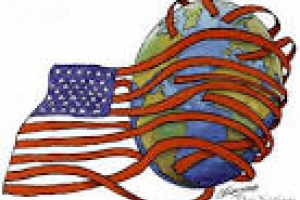American diplomat, author, and writer, Charles W. Freeman, Jr, who served in the US Foreign Service, and the State and Defense Departments in various capacities for thirty years, before falling victim toa campaign against him by the Israel lobby, because of his outspoken statements against the state terrorism of the illegal Zionist entity and Washington’s blanket American support for its crimes, has written an investigative article titled "End of the American Empire".
This brings me to the sources of civilian incompetence. As President Obama recently said, there’s a Washington playbook that dictates military action as the first response to international challenges. This is the game we’ve been playing—and losing—all around the world. The cause of our misadventures is homemade, not foreign. And it is structural, not a consequence of the party in power or who’s in the Oval Office. The evolution of the National Security Council Staff helps understand why.The National Security Council is a cabinet body established in 1947 as the Cold War began to discuss and coordinate policy as directed by the president. It originally had no staff or policy role independent of the cabinet. The modern NSC staff began with President Kennedy. He wanted a few assistants to help him run a hands-on, activist foreign policy. But the staff he created has grown over decades to replace the cabinet as the center of gravity in US decisions on foreign affairs. Kennedy’s initial NSC staff numbered six men, some of whom, like McGeorge Bundy and Walt Rostow, achieved infamy as the authors of the Vietnam War. Twenty years later, when Ronald Reagan took office, the NSC staff had grown to around 50. By the time Barack Obama became president in 2009, it numbered about 370, plus another 230 or so people off the books and on temporary duty, for a total of around 600. The bloat has not abated. If anyone knows how many men and women now man the NSC, he or she is not talking. The NSC staff, like the department of defense, has never been audited.Size and numbers matter. Among other things, they foster is overspecialization. This creates what the Chinese call the narrow vision of a frog at the bottom of a well. The frog looks up and sees a tiny circle of light that it imagines is the entire universe outside its habitat. With so many people now on the NSC staff, there are now a hundred frogs in a hundred wells, each evaluating what is happening in the world by the little bit of reality it perceives.
In many ways too, the NSC staff has evolved to resemble the machinery in a planetarium. It turns this way and that and, to those within its ambit, the heavens appear to turn with it. But this is an apparatus that projects illusions. Inside its event horizon, everything is comfortingly predictable. Outside—who knows?This is a system that creates and implements foreign policies suited to US narratives but detached from external realities, often to the point of delusion, as America’s misadventures in Afghanistan, Iraq, Libya, and Syria illustrate. And the system never admits mistakes. To do so would be a political gaffe, even if it might be a learning experience.We have come up with a hell of a way to run a government, let alone an informal empire manifested as a sphere of influence. At home, the American people feel that they have been reduced to the status of the chorus in a Greek tragedy. They can see the blind self-destructiveness of what the actors on the political stage are doing and can moan out loud about it. But they cannot stop the actors from proceeding toward their (and our) doom.Abroad, our client states and partners are dismayed. And our influence is ebbing away.
Whatever the cure for our foul mood and foreigners’ doubts about us may be, it is not spending more money on our armed forces, piling up more debt with military Keynesianism, or pretending that the world yearns for us to make all its decisions for it or to be its policeman. But that’s what almost all our politicians now urge as the cure to our sense that our nation has lost its groove. Doing what they propose will not reduce the threat of foreign attack or restore the domestic tranquility. It will not rebuild our broken roads, rickety bridges, or underperforming educational system. It will not reindustrialize America or modernize our infrastructure. It will not enable us to cope with the geo-economic challenge of China, to compete effectively with Russian diplomacy, or to halt the metastasis of terrorism. And it will not eliminate the losses of international credibility that foolish and poorly executed policies have incubated.
Both the president and the Congress now honor the Constitution ever more in the breach. In our system, money talks to such an extent that the Supreme Court has equated it to speech. Our politicians are prepared to prostitute themselves to both domestic and foreign causes for cash.Policy dialogue has become tendentiously representative of special interests – uninformed, and inconclusive. We are showing the world how great republics and empires die, not how they make sound decisions or defend spheres of influence.Spheres of influence entail liabilities for those who manage them but not necessarily for the countries they incorporate. Take the Philippines, for example. Secure in the US sphere, it did not bother to acquire a navy or an air force before suddenly—in the mid-1970s—asserting ownership of islands long claimed by China in the nearby South China Sea and seizing and settling them. China has belatedly reacted. The Philippines still has no air and naval power to speak of. Now it wants the US to return in sufficient force to defend its claims against those of China.
It’s gratifying to be wanted. Other than that, what’s in this for us? A possible American war with China? Even if such a war were wise, who would go to war with China with us on behalf of Filipino claims to worthless sandbars, rocks, and reefs? Surely it would be better to promote a diplomatic resolution of competing claims than to help ramp up a military confrontation.The conflicts in the South China Sea are first and foremost about the control of territory—sovereignty over islets and rocks that generate rights over adjacent seas and seabeds. Our arguments with China are often described by US officials as about “freedom of navigation.” If by this they mean assuring the unobstructed passage of commercial shipping through the area, the challenge is entirely conjectural. This sort of freedom of navigation has never been threatened or compromised there. It is not irrelevant that its most self-interested champion is China.
But what we mean by freedom of navigation is the right of the US Navy to continue unilaterally to police the global commons off Asia, as it has been for seventy years, and the right of our navy to lurk at China’s twelve-mile limit while preparing and practicing to cross it in the event of a US-China conflict over Taiwan or some other casus belli. Not surprisingly, the Chinese object to both propositions, as we would if the People’s Liberation Army Navy were to attempt to do the same twelve miles off Block Island or a dozen miles from Pearl Harbor, Norfolk, or San Diego.We persist, not just because China is the current enemy of choice of our military planners and armaments industry, but because we are determined to perpetuate our unilateral dominance of the world’s seas. But such dominance does not reflect current power balances, let alone those of the future. Unilateral dominance is a possibility whose time is passing or may already have passed.
As the world’s largest trading nation, about to overtake Greece and Japan as the owner of the world’s largest shipping fleet, China has more at stake in the continuation of untrammeled international commerce than any other country. Why not leverage that interest to the advantage of a recrafted world and Asian-Pacific order that protects our interests at lower cost and lessened risk of conflict with a nuclear power?
We might try a little diplomacy elsewhere as well. In practice, we have aided and abetted those who prefer a Syria in endless, agonized turmoil to one allied with Iran. Our policy has consisted of funneling weapons to Syrian and foreign opponents of the Assad government, some of whom rival our worst enemies in their fanaticism and savagery. Five years on, with at least 350,000 dead and over ten million Syrians driven from their homes, the Assad government has not fallen. Perhaps it’s time to admit that we didn’t just ignore international law but seriously miscalculated political realities in our effort to overthrow the Syrian government.Russia’s deft empowerment of diplomacy through its recent, limited use of force in Syria has now opened an apparent path to peace. Perhaps it’s time to set aside Cold War antipathies and explore that path. Peace in Syria is the key to putting down Da`esh (the so-called “caliphate” that straddles the vanished border between Syria and Iraq). Only peace can end the refugee flows that are destabilizing Europe as well as the Levant.
Ukraine needs political and economic reform more than it needs weapons and military training. Only if Ukraine is at peace with its internal differences can it be secured as a neutral bridge and buffer between Russia and the rest of Europe. Demonizing Mr. Putin will not achieve this. Doing so will require embarking on a search for common ground with Russia.Unfortunately, as the moronic Islamophobia that has characterized the so-called debates between presidential candidates illustrates, there is at present no comparable trend toward realism in our approach to Muslim terrorism. We need to face up to the fact that US interventions and other coercive measures have killed as many as two million Muslims in recent decades. One does not need an elaborate review of the history of European Christian and Jewish colonialism in the Middle East or American collusion with both to understand the sources of Arab rage or the zeal of some Muslims for revenge.
Twenty-two percent of the world’s people are Muslim. Allowing bombing campaigns and drone warfare to define our relationship with them is a recipe for endless terrorist backlash against us. In the Middle East, the United States is now locked in a death-filled dance with fanatic enemies, ungrateful client states, alienated allies, and resurgent adversaries. Terrorists are over here because we are over there. We’d be better off standing down from our efforts to sort out the problems of the Islamic world. Muslims are more likely to be able to cure their own ills than we are to do this for them.
We need a peaceful international environment to rebuild our country. To achieve this, we must erase our strategy deficit. To do that, the next administration must fix the broken policymaking apparatus in Washington. It must rediscover the merits of measures short of war, learn how to use military power sparingly to support rather than supplant diplomacy, and cultivate the habit of asking “and then what?” before beginning military campaigns.
When he was asked in 1787 what system he and our other founding fathers had given Americans, Benjamin Franklin famously replied, “a republic, if you can keep it.” For two centuries, we kept it. Now, if we cannot repair the incivility, dysfunction, and corruption of our politics, we will lose our republic as well as our imperium. America’s problems were made in the USA, by Americans, not by refugees, immigrants, or foreigners. They cry out for Americans to fix them


















